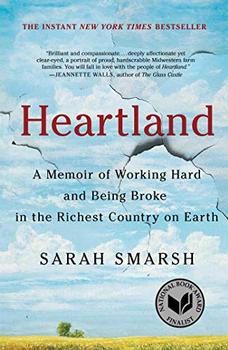Summary | Excerpt | Reading Guide | Reviews | Beyond the Book | Readalikes | Genres & Themes | Author Bio

Critics' Opinion:
Readers' Opinion:
First Published:
Sep 2018, 304 pages
Paperback:
Sep 2019, 304 pages
 Book Reviewed by:
Book Reviewed by:
Rebecca Renner
Buy This Book
Things were looking up. We got a cocker spaniel. I had Flintstones vitamins and a pink canopy bed. On Friday nights, Mom and Dad told me goodbye at the door and walked into the night dressed up—Mom with big, curled hair and bright blush on her cheeks, Dad wearing his snakeskin boots and smelling like Irish Spring soap and aftershave. They went out to dance halls, where Dad drank Canadian whiskey and Mom drank diet pop. During the days, while the two of them went to work, I briefly attended a preschool. I was three years old and had already lived in four places, enough to know that a canopy bed and vitamins was high on the hog.
When Dad had paid off the bit of land he bought for our house, he used it as collateral for a bank loan to buy building materials. It was early 1983, and the construction industry could feel a recession coming on. His father warned him against borrowing money when the economy didn't look stable. But Dad told him he had faith in the United States. He believed that things would get better.
The small-town banker wanted to know how he'd pay back the loan if work didn't pick up.
"I'll chop and sell wood if I have to," Dad told him.
He signed for the loan, and we headed back to the country.
By then, the trailer on our land had been moved back to Betty and Arnie's farm for some other relatives. So we moved into their farmhouse. My parents and I shared a bed upstairs that autumn.
Twelve miles down the road, before the air got too cold for cement-pouring, Dad laid the foundation for our new house. As the earth around us hardened into winter, Dad did the electric wiring himself. He hired a man from Mount Hope, a nearby small town, to do the plumbing and the air conditioner. The bricklayer would have to wait. The cold had come fast and hard, and mortar would freeze before he could smear it.
Arnie lent his posthole digger for Dad to put up a new pole barn. They dug the holes, loaded huge poles into the back of a wheat truck, and dropped each one into a hole, tamping dirt and pouring concrete from pole to pole. They nailed two-by-fours horizontally between the poles and hoisted the trusses with a tractor scoop. Male friends, their legs tightly wrapped around the tops of the poles, grabbed for the swinging trusses. When the frame was done, they slid sheets of tin up, up, and over.
The pole barn seemed to me a great, mysterious place, where men were dirty and spoke a language of measurements—bushels of wheat, kernels per head, miles per gallon, acres of milo, points on a buck, yards to the eight-point buck. I loved when they brought me along on chores or to cattle auctions.
I've heard stories that Grandpa Arnie was a violent, blustery dad to his own kids a couple decades prior. If so, he had changed by the time I came along, as often happens on the way from parenting to grandparenting. He would zoom me around on his three-wheeler to help feed the cows, keep me on his lap while he drove the tractor, tell me what tool to hand him in the work shed. He thought I was hilarious. He took to calling me "Sarah Lou," for some reason, even though my middle name was Jean, after my mom. Before long he and Grandma Betty just called me "Lou."
It makes me laugh now, seeing that many of the women I knew had what amounted to one-syllable trucker handles for nicknames. Betty was Sis. Her sister Dorothy was called Pud—short for "Puddin'?"—so she wouldn't be confused with their mother. Because of Grandpa Arnie, I was Lou.
Like most of the men I grew up around, Arnie's surfaces were rough: enormous brown, chapped hands with bruised fingernails like my dad's; heavy, pointy-toed leather boots; wiry sideburns; a scratchy brimmed cap of mesh plastic and the logo for the meat locker where he butchered. I knew him as a tender person, though. He showed me how to pull a xylophone by a string and, years later, a hayrack by a truck with a manual transmission. He cried when he accidentally tipped over the three-wheeler we were riding and I broke my arm.
Excerpted from Heartland by Sarah Smarsh. Copyright © 2018 by Sarah Smarsh. Excerpted by permission of Scribner. All rights reserved. No part of this excerpt may be reproduced or reprinted without permission in writing from the publisher.





The House on Biscayne Bay
by Chanel Cleeton
As death stalks a gothic mansion in Miami, the lives of two women intertwine as the past and present collide.

The Flower Sisters
by Michelle Collins Anderson
From the new Fannie Flagg of the Ozarks, a richly-woven story of family, forgiveness, and reinvention.

The Funeral Cryer by Wenyan Lu
Debut novelist Wenyan Lu brings us this witty yet profound story about one woman's midlife reawakening in contemporary rural China.
Your guide toexceptional books
BookBrowse seeks out and recommends the best in contemporary fiction and nonfiction—books that not only engage and entertain but also deepen our understanding of ourselves and the world around us.